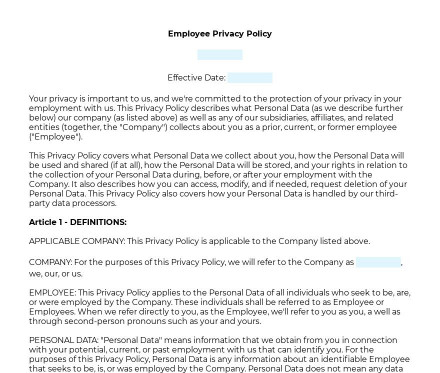Employee Privacy Policy Free
Employers can use an Employee Privacy Policy to let their employees know how their personal data will be processed.


 Template Overview
Template Overview
Employers can use an Employee Privacy Policy to let their employees know how their personal data will be processed. Personal data is any information that can personally identify an employee. The employer may collect this information for employment purposes. This document is conventionally unilateral. Negotiations do not take place at the time the contract is concluded because the employer simply warns the employee that the employee's personal data is being collected, used, stored, and preserved. Although, it is still a type of agreement as employers cannot manage and handle the employee's information unless they have been notified.
This document is an essential tool in a work environment. An Employee Privacy Policy ensures that employees are familiar with the rules on how their personal data will be processed. This document is particularly important when a business collects sensitive information (such as health data, racial or origin data, etc.). The Employee Privacy Policy needs to set out all of this so that both parties would be aware of this information.
This specific document is intended for the use in the United States but is also in compliance with the EU's General Data Protection Regulation, or GDPR, for handling and processing of personal data of EU citizens.
You fill out a form. The document is created before your eyes as you respond to the questions.
At the end, you receive it in Word and PDF formats. You can modify it and reuse it.
 How to use this template
How to use this template
The primary purpose of this Employee Privacy Policy is to outline what information will be collected from employees, how and where it will be shared and used. The representative of the company completing this document must know all the necessary information regarding the company's processing of personal data. To ensure this, you can perform a technical inspection or talk to other employees of the company about the employee security.
The employer can add the following information to a document (and more):
- what personal data is known about the employee
- how the data is used
- if data is shared with related entities
- if data is shared with third parties
- what the employee's rights are concerning the data collected
- how users can contact the employer or employer's representative if they have any questions
Whenever a business intends to collect personal data from employees, it must apply the Employee Privacy Policy. The completed document should be given to employees.
Note that it is mandatory to let employees know how their data will be processed.
 Applicable law
Applicable law
While no law defines what should in an Employee Privacy Policy be, information disclosures are broadly governed under U.S. Common Law and the Federal Trade Commission. Employment-specific policies regarding information collection, retention, and disclosure may be covered by state and federal statutes, such as those relating to privacy, labor unions, and the employment relationship generally. This Employee Privacy Policy is also compliant with the EU's General Data Protection Regulation, or GDPR, for those companies which may process the data of EU citizens.
Ready to build your document from this template?



 Please wait
Please wait